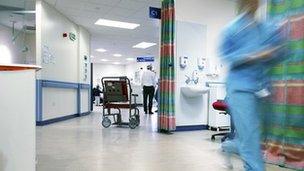Debt 'putting off' medical students, BMA warns
- Published

Doctors are being balloted on the government's pension proposals
The prospect of high student debt and increased pension contributions could discourage young people from entering medicine, a doctor has warned.
Tom Dolphin, of the British Medical Association, told the Junior Doctors Conference that students paying £9,000 tuition fees will have debts of up to £70,000 by the time they start working.
He urged delegates to fight government plans to change the NHS pension scheme.
Health minister Simon Burns said pension reform was "necessary".
Ballot papers are being sent to 103,000 BMA members.
It is the first time doctors have been balloted for industrial action since 1975.
'Not much cheer'
The government says the plans, under which the pension age would rise to 68, and contributions could reach 14.5% for the highest earners, are a "fair deal for staff and taxpayers".
The result of the vote on pension changes is due at the end of the month.
Dr Dolphin, chairman of the BMA's Junior Doctor Committee, said: "At the moment, it is genuinely hard to find much cause for cheer."
Addressing the conference in central London, he said: "We need to put up a fight. Imagine for a moment you were applying for a place at medical school right now. With £9,000 tuition fees you will be facing debts on graduation of up to £70,000.
"When you start working, a big chunk of your salary will be used to repay these debts. With salaries frozen for many years, your starting salary will have been eroded by inflation.
"And on top of that you will be faced with increased pension contributions."
He added: "The burden of austerity is falling too hard on the shoulders of the younger generation and we are seeing this in medicine, too.
"With a future like this, will medicine still be able to attract and retain some of the most talented young people? Would you still make the choice to study medicine?"
'Fair' deal
Doctors at the start of their careers would be hardest hit, having to pay hundreds of thousands of pounds extra - double what they would have paid - in lifetime pensions contributions, according to the BMA.
Dr Dolphin said: "The government wants us to pay more and work longer for what will probably be a worse pension.
"The extra contributions add up to more than £200,000 for many junior doctors."
Health Minister Simon Burns said there was "no justification" for doctors to take industrial action and that it would "gain them nothing".
"Our proposals mean doctors will continue to receive pensions that are among the highest in the public or private sectors," he said.
"A doctor joining the new scheme after 2015 could expect a pension of around £68,000 per year at state retirement age."
"Pension reform is necessary because people are living longer, healthier lives.
"Our proposals are a fair deal for staff and taxpayers and make public service pensions affordable and sustainable."
He added: "It is fair that higher earners pay greater contributions relative to those on lower and middle incomes.
"Lower earner members should not be footing the bill - that is why we have protected those on lower salaries."
- Published1 March 2013
- Published8 December 2011
- Published9 February 2012
- Published10 May 2012
- Published10 March 2011